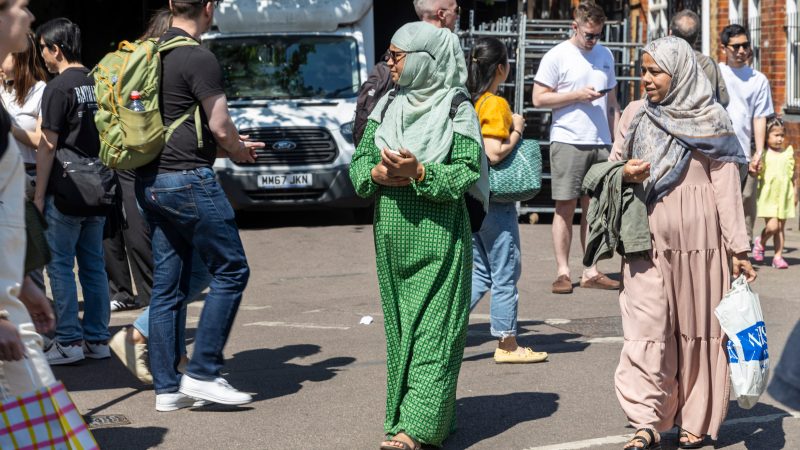
November marks Islamophobia Awareness Month. This year it coincided with Zohran Mamdani’s historic election as New York’s first Muslim mayor. It was a campaign scarred by bigotry, hate and hostility; targeted with over a million posts on social media containing Islamophobic slurs.
Just as with the election of Sadiq Khan in London, Muslims in both New York and London know that representation at the top does not mean safety or equality for those below.
Muslim communities are facing an avalanche of hate on both sides of the Atlantic. We cannot wait for another tragedy before Islamophobia is taken seriously. It is sad to say, but the Muslim community in Britain feels strongly that our lives aren’t seen to matter.
READ MORE: ‘Bread, circuses, and polling errors: Are we truly measuring what matters?’
Anti-Muslim hate is escalating. Threats to our safety are normalised both online and on our streets. Yet the Government has no strategy to protect us.
Earlier this month, a group of MPs wrote to the new Secretary of State for Housing, Communities and Local Government, urging him to adopt a definition of Islamophobia.
Despite a working group led by former Conservative Attorney General Dominic Grieve being formed in February, no plans have materialised. Indeed, some news outlets report that its work has been paused.
This inaction stands in stark contrast to the rising hate crimes against Muslims which are now at the highest levels on record. In 2025, 45% of religious hate crimes were directed towards Muslims. Islamophobic hate crimes have risen 92% since 2023, almost doubling in two years.
Behind these statistics are real people. Feeling fearful and unvalued in the country we call home.
Muslims continue to be held to a higher standard. We are judged collectively, expected to condemn and apologise as though our belonging must constantly be re-earned.
The overwhelming majority of Muslims reject violence and extremism, yet our condemnation rarely counts and our humanity is overlooked.
This sustained hostility has consequences. 25 mosques have been attacked in recent months, including vandalism and assaults on worshippers. Several terrorist plots targeting mosques have been foiled, without significant national media focus.
Islamophobia is normalised, mainstreamed and rarely called out. I tend to agree with the sentiment laid out in the title of Baroness Warsi’s recent book: “Muslims Don’t Matter”.
Recent Government funding for the British Muslim Trust, through the new Combatting Hate Against Muslims Fund, and the extra £10 million for the Protective Security for Mosques Scheme is welcome, but still not enough.
These grants will help monitor anti-Muslim hate and pay for CCTV, alarms and security at mosques and faith centres. But funding alone cannot shift a culture in which anti-Muslim hate is normalised. Protecting communities means confronting prejudice, far-right narratives and the wider breakdown in social cohesion.
In calling for an agreed definition of Islamophobia, Muslims in Britain are not demanding censorship, as elements of the media suggest. We are demanding recognition, equality and protection.
Subscribe here to our daily newsletter roundup of Labour news, analysis and comment– and follow us on Bluesky, WhatsApp, X and Facebook.
Existing laws, including the Equality Act, provide principles but cannot prevent harassment, online threats, or structural discrimination. A clear operational non-statutory definition of Islamophobia is necessary for consistent data, accountability and policy responses.
A credible Labour strategy must be actionable, intersectional and co-designed with Muslim communities. It must recognise how Islamophobia intersects with race and gender, disproportionately affecting Muslim women.
Empathy must guide this work and education is central to this. Muslim stories are woven into the nation’s fabric, from the lascars and medics who served in the World Wars to the scientists, artists, and entrepreneurs shaping Britain today.
I see the impact education has every week. Through Solutions Not Sides, I help facilitate dialogue in schools about the Israel-Palestine conflict by bringing a Palestinian and an Israeli into classrooms to speak directly with pupils.
These sessions build empathy and strengthen social cohesion, while aiming to reduce antisemitism and Islamophobia. Young people are often more willing than adults to listen, question and imagine a different path.
Share your thoughts. Contribute on this story or tell your own by writing to our Editor. The best letters every week will be published on the site. Find out how to get your letter published.
Labour must lead with action, not gestures. A definition, a national strategy and a clear commitment to safety and equality are essential. Until these steps are taken, Muslim communities will continue to hear the same message – that their lives do not matter in Britain.
-
- SHARE: If you have anything to share that we should be looking into or publishing about this story – or any other topic involving Labour– contact us (strictly anonymously if you wish) at [email protected].
- SUBSCRIBE: Sign up to LabourList’s morning email here for the best briefing on everything Labour, every weekday morning.
- DONATE: If you value our work, please chip in a few pounds a week and become one of our supporters, helping sustain and expand our coverage.
- PARTNER: If you or your organisation might be interested in partnering with us on sponsored events or projects, email [email protected].
- ADVERTISE: If your organisation would like to advertise or run sponsored pieces on LabourList‘s daily newsletter or website, contact our exclusive ad partners Total Politics at [email protected].




More from LabourList
‘Labour won’t stop the far right by changing leaders — only by proving what the left can deliver’
‘Cutting Welsh university funding would be economic vandalism, not reform’
Sadiq Khan signals he will stand for a fourth term as London Mayor